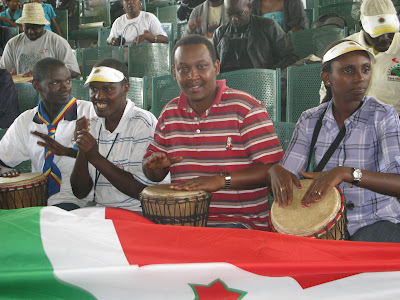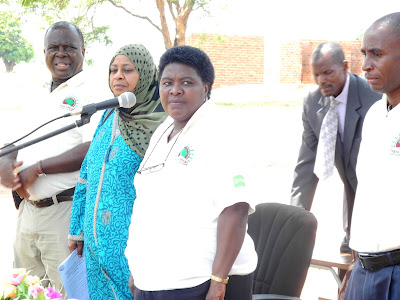 |
| Grace and Ronica during the Interview |
Every time l thought of writing this story, a sly grin would cross my face. These two women farmers from Zambia literally connected climate change and the waning of marriages in their rural villages. I will come back to that in a minute.
Meet Grace Tepula who is small scale Zambian Dairy Farmer and a mother of five and who has 5 grandchildren. She also grows maize and groundnuts. And adds, ‘Maize is the staple food of Zambia you know.’ I nod.
We are standing outside the International Conference Centre in Durban, South Africa while having this interview. She is excited to be talking to me but has this expression on her face that says, we had better get it right in Durban.
Climate change has affected the community she finds herself in. ‘Climate change has reduced our milk from 50 to 60 liters a day to 30 to 40 liters a day, ‘ she says. Adding that the hot weather makes it difficult to grow fodder for the animals which are zero grazed for purposes of reducing diseases.’
Of the rains and expected harvest she says, ‘There has been a drop in harvest because of wells that are drying up.’ Maria, she calls my name. I gesture knowingly. ‘There has been reduction of water levels. The hot season that starts in August and ends in October has had an extension,’ Grace adds. This has been to their detriment. It has simply meant that they didn’t have fodder for their animals.
Another farmer standing next to her quips in, ‘ It has also meant that we are buying the fodder at expensive rates.’ That is Ronica Mona who is a mother of 5 children and 5 grandchildren and who lives in Luanshya. Their faces defy their ages. I guess it is the jovialness they have as they do this interview or is it because they just had a demonstration where they demanded their rights in front of international media? I can’t put a finger on which. I am glad they are doing this in the first place. Back to the interview.
Grace tells me that commercial farmers are making a killing from selling them expensive fodder for their animals. ‘I would rather grow my own fodder to avoid the expense, ‘she says. Adding that, the big scale farmers are privileged because they are able to irrigate their farms.'
Ronica brings in the twister that l mentioned above. ‘Our men failed to dig copper because our mines were closed. The women through Heifer International got empowered and started digging white gold, milk,’ she says with what seems like a sly grin on her face. ‘ Our marriages are now stable and we are looking after our men,’ she adds.
Grace who is standing next to her jumps in quickly, ‘ Men who don’t work in Zambia are called Loafers. These men experience inferiority complex when they are idle but because of the white gold they no longer are idle and broke.’
Adding proudly, ‘We take care of the animals, milk them and sell the products. After we are done, we bring the money back to the family and all is well.’ I grin. It is just the way they light up when they discuss this subject.
The white gold is however getting threatened by climate change.
Grace tells me that every animal needs 40 to 80 liters of water on a daily basis. Something that is no longer viable because of the hot weather and drying up of wells.
They have a message to leaders attending COP17. ‘Help us financially to cope with droughts and famines because you are the main emitters and therefore cause that greatest mess,’ says Grace.
Ronica winds it up by saying, ‘We want a fair deal. ‘ The interview is over but the women start to laugh in unison. I know they know. Ronica says as if reading my mind, ‘What we have told you about our marriages is true.’
By Maria Wanza



























